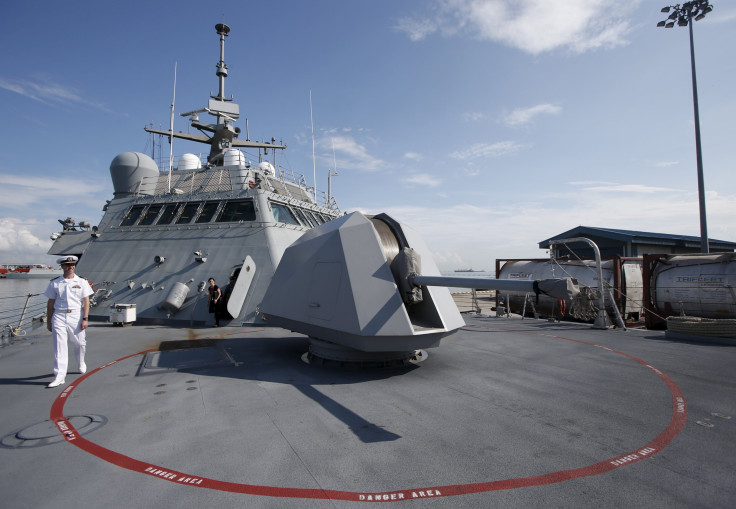Another Warship Sails Close To South China Sea Islands As US Navy Steps Up Operations

The U.S. Navy seems to have stepped up its so called "freedom of navigation" operations in the disputed South China Sea, sailing warships near to the artificial islands built by China more than once in a week. The latest player in the region was the guided-missile destroyer USS Wayne E Meyer, which Thursday challenged restrictions on innocent passage near the the Paracel Islands.
The Navy, as reported by the International Business Times, has deployed two of its Independence-class littoral combat ships in the South China Sea, and one of them, the USS Gabrielle Giffords, on Wednesday traveled to within 12 nautical miles of Mischief Reef, one of the heavily manned artificial islands. There was no mention of the other littoral combat ship, the USS Montgomery, which is also in the area.
With the reported presence of the USS Wayne E Meyer, there seem to be three U.S. warships operating in the disputed waters, which is a marked increase from the normal tempo of operations, with a battleship or carrier group transiting through the region.
Tensions between the United States and China appear to be at a fever pitch now, with Beijing issuing a warning that the U.S. stop flexing muscles in the South China Sea, and having sailed its aircraft carrier through the sensitive Taiwan strait. Adding to the tensions, trade talks between the two countries have dragged on without reaching a firm agreement, and there is speculation that President Trump may sign bills passed by the House and Senate over the pro-democracy protests in Hong Kong.
China also sailed its aircraft carrier through the Taiwan strait this week.
On Friday, the People's Liberation Army Southern Theatre Command said in a statement that its sent military vessels to identify and monitor the U.S. ships and warned them to leave. "Recently, the US has used the pretext of 'freedom of navigation' to frequently send warships to the South China Sea area to cause trouble," the statement said.
The artificial islands in the South China Sea were built up by the Chinese government to establish full military bases and assert dominance in an area to support the expansive territorial claims Beijing has made in the area and demarcated by the so-called Nine-Dash Line. But several countries in the region, like Vietnam, the Philippines, Malaysia, Brunei and Taiwan (which China considers a renegade province) have overlapping claims on the oil-rich waters.
The South China Sea also happens to be a major shipping route where international law applies, and all vessels have freedom of movement. The U.S. Navy's freedom of navigation operations are aimed at asserting this right and to vex China. Chinese ships were reported to have responded by sailing around the USS Ronald Reagan during the carrier's transit through the disputed waters recently.
The Navy has also encouraged other countries and their vessels to assert their right of way in the area and to assert their territorial claim to the numerous islands there.
While the headlines make it sound like a dire situation, it seems more along the lines of saber-rattling and the same old rhetoric. The Chinese would be foolish to lash out, especially considering the political situation in Hong Kong and a slowing economy, but that possibility, no matter how small, does always exist.
© Copyright IBTimes 2024. All rights reserved.






















